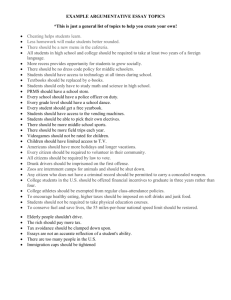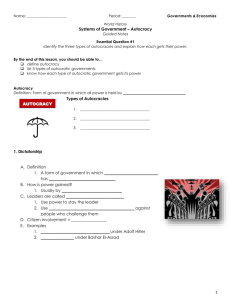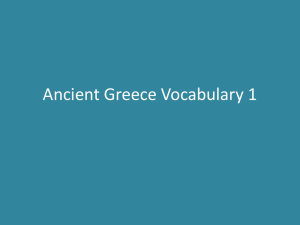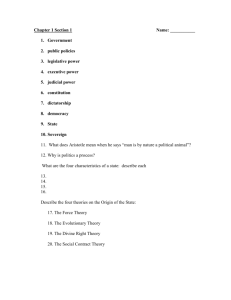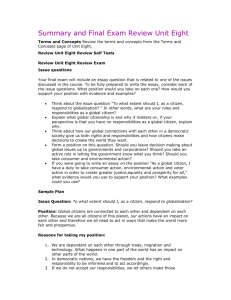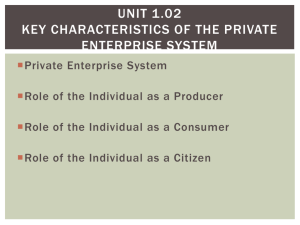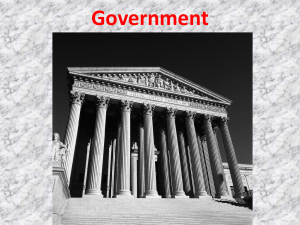File
advertisement
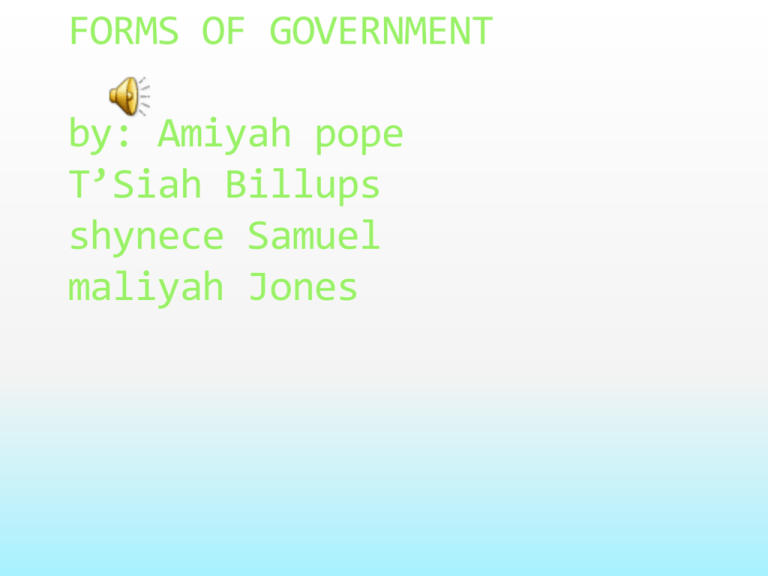
FORMS OF GOVERNMENT by: Amiyah pope T’Siah Billups shynece Samuel maliyah Jones Distribution of Power Unitary, Federal, Confederation Ways Governments Distribute Power Federal (Federation) Power is divided between one central and several regional authorities. Ways Governments Distribute Power Unitary Power is held by one central authority. Ways Governments Distribute Power Confederation Voluntary association of independent states that often only delegate a few powers to the central authority. o secure some common purpose o agree to certain limitations on their freedom of action. How a government distributes power affects citizen participation in the German government. How Governments Determine Citizen Participation Low or No Participation Autocratic Low or No Participation Oligarchic Citizen Participation Government Power General Citizens’ Participation Select Citizens’ Participation Government Power High Participation Citizen Participation Government Power High Participation Low or No Participation Democratic How Governments Determine Citizen Participation Autocratic An autocracy is a form of government in which one person possesses unlimited power and the citizen has little if any role in the government. How Governments Determine Citizen Participation Autocratic • An autocracy is the oldest form of government. • An autocracy is one of the most common forms of government. • An autocracy maintains power through inheritance or ruthless use of military and police power. How Governments Determine Citizen Participation One Form of Autocracy: Absolute or Totalitarian Dictatorship • The ideas of a single leader are glorified. • The government tries to control all aspects of social and economic life. • The government is not responsible to the people. • People lack the power to limit their rulers. (Examples: Adolf Hitler, Benito Mussolini, Joseph Stalin) How Governments Determine Citizen Participation A Second Form of Autocracy: • Absolute Monarchy • The king, queen, or emperor exercises the supreme powers of government with unlimited power. • The position is usually inherited. • People lack the power to limit their rulers. • Absolute monarchs are rare today. (Example: King of Saudi Arabia) How Governments Determine Citizen Participation Oligarchic An oligarchy is government by the few; it is sometimes a government in which a small group exercises control especially for corrupt and selfish purposes. (The citizen has a very limited role.) How Governments Determine Citizen Participation Oligarchic • The group gets its power from military power, social power, wealth, religion or a combination. • Political opposition is usually suppressed— sometimes violently. • Leaders in the party and armed forces control the government. (Example: communist countries such as China) How Governments Determine Citizen Participation Democratic A democracy is a form of government in which the supreme power is held by the people and exercised by them directly or indirectly through a system of representation. (It usually involves periodically held free elections.) How Governments Determine Citizen Participation Democratic There are two types of democracies: •parliamentary •presidential How Governments Determine Citizen Participation High Participation Low or No Participation ? Low or No Participation ? Citizen Participation Government Power General Citizens’ Participation Select Citizens’ Participation Government Power Government Power Citizen Participation High Participation Low or No Participation ? DICTATORSHIP Government by a dictator A country governed by a dictator Absolute authority in any sphere European dictators ALDOFT HITLER ,VALDMIR LENIN AFRICAN DICTATORS PAUL BIYA , MICHEAL SATA AMERICAN DICTATORS HUGO CHAVEZ , ERIC GAIRY REPUBLIC A republic is a government in which power resides in the people , and the government is ruled by elected leaders run according to law. Chief of state Gen. Markus Laubenthal, most recently the commander of Germany's 12th Panzer Brigade in Amberg, and chief of staff of Regional Command North, International Security Assistance Force Afghanistan, will be stationed at USAREUR headquarters, Wiesbaden, Germany. the titular head of a nation as distinct from the head of the government Head of government Head of government is a generic term used for either the highest, or second highest, official in the executive branch of a sovereign state, a federated state, or a selfgoverning colony who often presides over a cabinet. Angela Dorothea Merkel is a German politician and a former research scientist, who has been the Chancellor of Germany since 2005 Parliamentary democracy A parliamentary system is a system of democratic governance of a state in which the executive branch derives its democratic legitimacy from, and is held accountable to, the legislature (parliament); the executive and legislative branches are thus interconnected. Presidential democracy A presidential democracy is a system of government in which also called an executive branch exist but is separate from the legislature. The system of government for Germany German System of Government Germany is federal republic and a democracy. At the national levels it has two chambers. The lower chamber which is the more important for many purposes - is elected partly on a 'first past the post system' and partly by proportional representation. It's generally considered a very fair electoral system. The country consists of sixteen states, which all enjoy a high degree of autonomy. The current government of Germany is a democratic one. It is headed by a president and a chancellor who oversee the parliament. Form of leadership in germany democratic traditions in Germany were weak. Democracy in 1918 (October) was first of all imposed from above - yes, by the Kaiser's government, in the hope of securing a more favorable ceasefire and peace treaty. Then, early in November came the much dreaded revolution Role of Germans The role of German are for that German were be allowed to vote. Voting requirements in Germany Women and men older than 18 have the right to vote. The German federal election system regulates the election of the members of the German Bundestag. According to the principles governing the law of elections. Freedoms and rights Human rights in Germany are protected extensively by the Grundgesetz. The country has ratified most international human rights treaties. Reports from independent organizations such as Amnesty International certify a high level of compliance with human rights, still pointing out several issues, in particular police brutality[1] and mistreatment. What is Germany??? Germany country in central Europe, on the Baltic Sea in the North. WHAT COUNTRIES ARE IN GERMANY??? WHAT HAS GERMANY DONE FOR THE WORLD?? It brought people in Europe closer together. It tries to make it essayer for Europeans to buy and sell things to each other. That was done by changing the rules and controlling trades. Thanks for watching!!!! Amiyah ,shynece, maliyah, and I put so much hard work and effort into this project. We hope that you boys and girls liked it.


